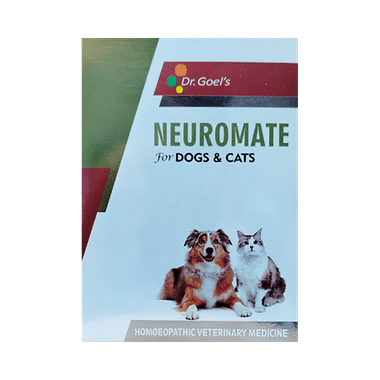Dr. Goel's Neuromate For Dog & Cat
(30 ml Oral Drops in bottle)
Rs. 298
Rs. 350
15% off
Rs. 298
Rs. 350
15% off
Not Available

Product Details
Dr. Goel's Neuromate for Dog and Cat
Epilepsy is a growing concern with pets and is a very common problem in veterinary. Epilepsy, sometimes called a seizure disorder, is a sudden, involuntary change in behaviour, muscle control, consciousness, and/or sensation. A seizure is often accompanied by an abnormal electrical discharge in the brain. The discomfort of the dog and the helplessness of the pet owners can be addressed with Neuromate for the pet. It is a homoeopathic veterinary medicine to manage epilepsy symptoms.
Key Ingredients:
Key Benefits:
Directions For Use:
Safety Information:
Epilepsy is a growing concern with pets and is a very common problem in veterinary. Epilepsy, sometimes called a seizure disorder, is a sudden, involuntary change in behaviour, muscle control, consciousness, and/or sensation. A seizure is often accompanied by an abnormal electrical discharge in the brain. The discomfort of the dog and the helplessness of the pet owners can be addressed with Neuromate for the pet. It is a homoeopathic veterinary medicine to manage epilepsy symptoms.
Key Ingredients:
- Ammonium Bromidum
- Avena Sativa
- Chamomilla
- Eschscholtzia Californica
- Humulus Lupulus
- Ignatia Amara
- Passiflora Incarnata
- Valeriana Officinalis
- Zincum Metallicum
Key Benefits:
- Ammonium bromiduma Prevents suffocating sensation before epilepsy, sudden strangling, suffocating, cough, indicated in chronic laryngeal and pharyngeal catarrh, neuralgic headaches, and obesity, constrictive pain in the head, chest, legs
- Avena sativa: It helps in selective action on the brain and nervous system, favourably inducing their nutritive function, leading indications are nervous exhaustion, sexual debility, general weakness, sleeplessness with nervous exhaustion and weakness, chronic insomnia, delirium tremens
- Chamomilla: The chief guiding symptoms belong to the mental and emotional group, which leads to this remedy in many forms of the disease, whining restlessness, fidgety, hyper, hasty, hurried, abrupt, sensitive nerves
- Eschscholtzia californica: It has been used as a nerve sedative to help induce peaceful sleep, causes general weakness, torpor, accelerated respiration, complete paralysis of the limbs, slowing of the circulation, nervous and restlessness, insomnia due to anxiety and worry
- Humulus lupulus: It also prevents giddiness and stupefaction, drawing and twitching in almost every muscle, nervous tremors, wakefulness, delirium, unstrung condition of the nervous system attended with nausea and dizziness, jaundice
- Ignatia amara: It helps to manage spasms and insanity after grief or fright, epilepsy after grief or fright, ignatia is useful in violent spasmodic effects, with rigidity, twitching, and tremors, nervous shuddering with pain
- Passiflora incarnata: It helps enhance the nervous system, hence an efficient nervine and anti-spasmodic remedy, tetanic convulsions affect mainly the muscles of the trunk, with predominant opisthotonos, violent tetanus, opisthotonos, trismus, and convulsions, tetanus infantum, neuralgias, internal and of the limbs, nervous disorders, general atonic conditions
- Valeriana officinalis: Valerians produce sensitiveness of the nerves, spinal, and genitourinary, affect the mind, muscles, calf, heels, and Achilles tendons, hysteria, over-sensitiveness, nervous affections, lack of reaction when well-chosen remedies fail, mental and physical dispositions change suddenly and go to the extreme, red parts turn white, epileptic fits, paralysis and contraction of limbs, hysterical, agitation of all nerves, jerks, twitches, trembling, restlessness, the impulse to move, can not keep still
- Zincum metallicum: It also manages and conditions chronic diseases with the brain and spinal symptoms, trembling, convulsive twitching, fidgety feet, convulsions with pale face and no heat, spinal disorders, twitching, convulsive twitching or jerking, worse at night during sleep, spasms from spinal injuries, etc
Directions For Use:
- For pups and kittens: 5-10 drops tds
- For cats: 10-15 drops tds
- For dogs (small breed): 15-20 drops tds
- For dogs (large breed): 20-25 drops tds
Safety Information:
- Over Counter (OTC) homoeopathic medicine that works naturally with no side effects, no drug interactions, and no contraindications
- Can be safely used along with other medications
- Drops work instantly when given onto the tongue
- Keep it away from the reach of children












